What's Happening?
Casper Ruud expressed his lack of confidence following his second-round defeat at the US Open to Raphael Collignon. Ruud, who has struggled throughout the Grand Slam season, attributed his performance issues to a lack of match wins and a lingering knee injury that forced him to miss Wimbledon. Despite a first-round victory, Ruud acknowledged that his success was more due to his opponent's mistakes than his own play. He plans to focus on improving his forehand and reducing errors in crucial moments. Ruud is set to participate in the Laver Cup in the coming weeks, where he hopes to regain his confidence.
Why It's Important?
Ruud's candid admission of his confidence issues highlights the psychological challenges athletes face, especially after a series of disappointing performances. His situation underscores the importance of mental resilience and self-assessment in sports. For Ruud, rebuilding confidence is crucial for his future success and competitiveness in tennis. His struggles may resonate with other athletes facing similar challenges, prompting discussions on mental health support and strategies for overcoming performance slumps. Ruud's focus on practice and honesty with himself reflects the ongoing effort athletes must make to maintain their competitive edge.
What's Next?
Ruud's participation in the upcoming Laver Cup presents an opportunity for him to regain confidence and improve his game. His focus on practice and self-improvement may lead to better performances in future tournaments. The tennis community will be watching Ruud's progress closely, as his ability to overcome his current challenges could inspire other players facing similar issues. Ruud's situation may also prompt discussions on the role of mental coaching and support systems in professional sports, potentially influencing how athletes approach their psychological well-being.
Beyond the Headlines
Ruud's struggles may lead to broader conversations about the pressures faced by professional athletes and the impact of injuries on their mental health. His experience could highlight the need for comprehensive support systems that address both physical and psychological aspects of athlete recovery. The emphasis on mental health in sports may encourage organizations to invest in resources that help athletes manage stress and build resilience. Ruud's candidness about his confidence issues could inspire other athletes to speak openly about their challenges, fostering a more supportive and understanding sports environment.









